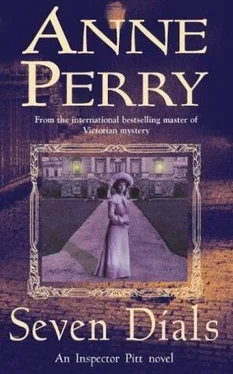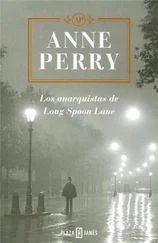“The evidence will be dramatic, my lord,” Markham replied coldly. “But it will not be theatrical.”
“Then proceed with it!” the judge snapped.
“I call Thomas Pitt!” Markham said loudly.
Narraway looked very briefly at Pitt, then turned on his heel and walked two paces to the nearest row where there was a vacant seat, and left Pitt to go across the floor and climb up the steps to the witness stand.
Pitt swore to his name and place of residence, and waited for Markham to ask him about el Abd. He was only slightly nervous about answering. This was the first time he had not testified as a police officer. Now he was a person from the shadows, without a rank or an occupation to give him status.
“Were you acquainted with Miss Zakhari’s house servant, Tariq el Abd, Mr. Pitt?” Markham enquired.
“Yes.”
“In what capacity?”
“As a servant at Eden Lodge,” Pitt replied. “I did not know him personally.”
“But you spoke with him at some length?” Markham pressed.
“Yes, perhaps an hour altogether.”
“So you would know him if you saw him again?”
“Yes.”
“Have you seen him since then?”
The jurors were openly fidgeting.
The counsel for the prosecution rose to his feet. “My lord, my learned friend’s idea of drama is very different from mine. I have never heard anything so unutterably tedious. Whatever relevance can it have if this… gentleman… has spent time gossiping with Miss Zakhari’s house servant… or not?”
“I was establishing that Mr. Pitt was able to identify Tariq el Abd, my lord,” Markham said with injured innocence, and without waiting for any ruling he turned back to Pitt. “Where did you see him, Mr. Pitt… and when?”
“In the morgue,” Pitt replied steadily. “Yesterday.”
There was a gasp of breath indrawn around the room.
The judge leaned forward, his face dark and angry. “Are you saying that he is dead, Mr. Pitt?”
“Yes, my lord.”
“From what cause?”
The prosecution stood up. “My lord, Mr. Pitt has no established credentials in medicine. He is not qualified to give evidence as to cause of death.”
The judge resented the objection, but he could not argue and he knew it. He glared at the counsel for the prosecution, then swiveled back to Pitt. “Where was this man found?”
“Hanging by his neck on a rope from under London Bridge, I was told by the river police,” Pitt replied.
“Suicide?” the judge barked.
“I am not qualified to say,” Pitt answered him.
There was a moment’s total silence, then a nervous titter washed around the room.
The judge’s face was like ice. He looked at Markham. “Can you continue with your case in view of the man’s death?” he said with barely concealed anger. His face was pink. He would not forget that Pitt had made the court laugh at his expense.
“Most certainly, my lord,” Markham said vigorously. “I cannot prove that Tariq el Abd’s death was suicide, but I can think of no conceivable way in which a man could find himself hanging with a rope around his neck under the arches of London Bridge by accident. I believe that any jury of twelve honest men must consider his responsibility for the death of Lieutenant Edwin Lovat a more than reasonable doubt as to whether my client is guilty or not. El Abd had every access to the gun which killed Lieutenant Lovat. It was his job to clean it. And he had every opportunity to have used it at that precise time and in that place. Justice, even reason, demands that you consider his guilt. His death now, almost assuredly by his own hand, makes it absurd not to.”
“It was not Tariq el Abd who was trying to dispose of the body!” The counsel for the prosecution was on his feet, his voice harsh with indignation. “If Ayesha Zakhari did not kill Lovat, why was she outside in the garden with the corpse in a wheelbarrow? That is not the action of an innocent woman.”
“It is the action of a frightened woman!” Markham said instantly. “If you came upon the body of a murdered man with your gun beside him, might you not attempt to hide it?”
“I would call the police,” the counsel for the prosecution retorted.
“In a foreign country?” Markham was close to jeering. “You would have such confidence in their justice, when you are of a different race, a different language, a different culture?” He did not continue. He could see in the faces of the jurors that he had made his point.
The counsel for the prosecution swung around to the judge, his arms spread wide. “Why, my lord? What reason in the world could an Egyptian house servant have for murdering an English diplomat in the middle of London?”
There was a movement in the gallery. A man rose to his feet. He was slender, elegant, beautifully dressed, his thick hair waved back from an aquiline face.
Pitt was astounded. It was Trenchard! He must have come home on leave.
“My lord,” Trenchard said with the utmost respect. “My name is Alan Trenchard. I am with the British Consulate in Alexandria. I believe I may be able to answer the court’s questions on that subject. I have lived and worked in Egypt for over twenty-five years, and I have been able to find a certain amount of knowledge on the issues concerned here since Mr. Pitt left Alexandria, which I was therefore unable to tell him at the time of his enquiry.”
The judge frowned. “If Sir Anthony wishes to call you, then in the interest of justice, we should hear from you.”
Markham had no choice. He excused Pitt, and Trenchard climbed the steps up to the witness stand and turned to face the court.
Pitt sat next to Narraway and felt him stiffen as Markham moved forward again and Trenchard swore to his name and his residence.
Markham seemed perfectly relaxed. His clients, who yesterday had faced certain conviction, now suddenly were on the brink of acquittal. It had been none of his doing, it was entirely due to circumstance he could not have foreseen or contrived, but it was still going to be an astonishing victory for him.
“Mr. Trenchard,” he began, “were you acquainted with Lieutenant Lovat during his army service in Egypt?”
“Not personally,” Trenchard replied. “I am in the diplomatic service; he was in the military. It is possible we may have met, but I am not aware of it.”
The judge frowned.
The jury glanced around them, their interest still barely caught.
Pitt found his hands clenched, nails digging into his palms.
Markham deliberately kept his eyes on the witness stand. “Did you know the dead man, Tariq el Abd?”
“I learned a great deal about him,” Trenchard replied. He was standing very stiffly with his hands on the rails, knuckles white.
Pitt felt a ripple of fear go through him, wild and unreasonable. He turned to look at the dock. Ryerson was intent, but there was no leap of emotion in him; he dared not yet hope. But Ayesha was leaning forward, her eyes wide in amazement as she gazed at Trenchard, and Pitt realized with horror that unmistakably she knew him, not by repute, as he had said, but personally, face-to-face.
Now, at last, the jury were straining to catch each word, even a look.
The courtroom was warm, but Pitt felt a deep and terrible chill inside himself. He remembered Trenchard’s saying that he had loved an Egyptian woman who had died in an accident a short time ago. Suddenly, almost as if he were there sitting on the ground with his bones aching and the soft lapping of the Nile in the darkness outside, he heard Ishaq telling of his father, the imam, and his dying nightmares of slaughter and burning bodies, and the daughter who had nursed him, heard all his words, his passion of grief and guilt, and who also had died shortly afterwards.
Читать дальше












